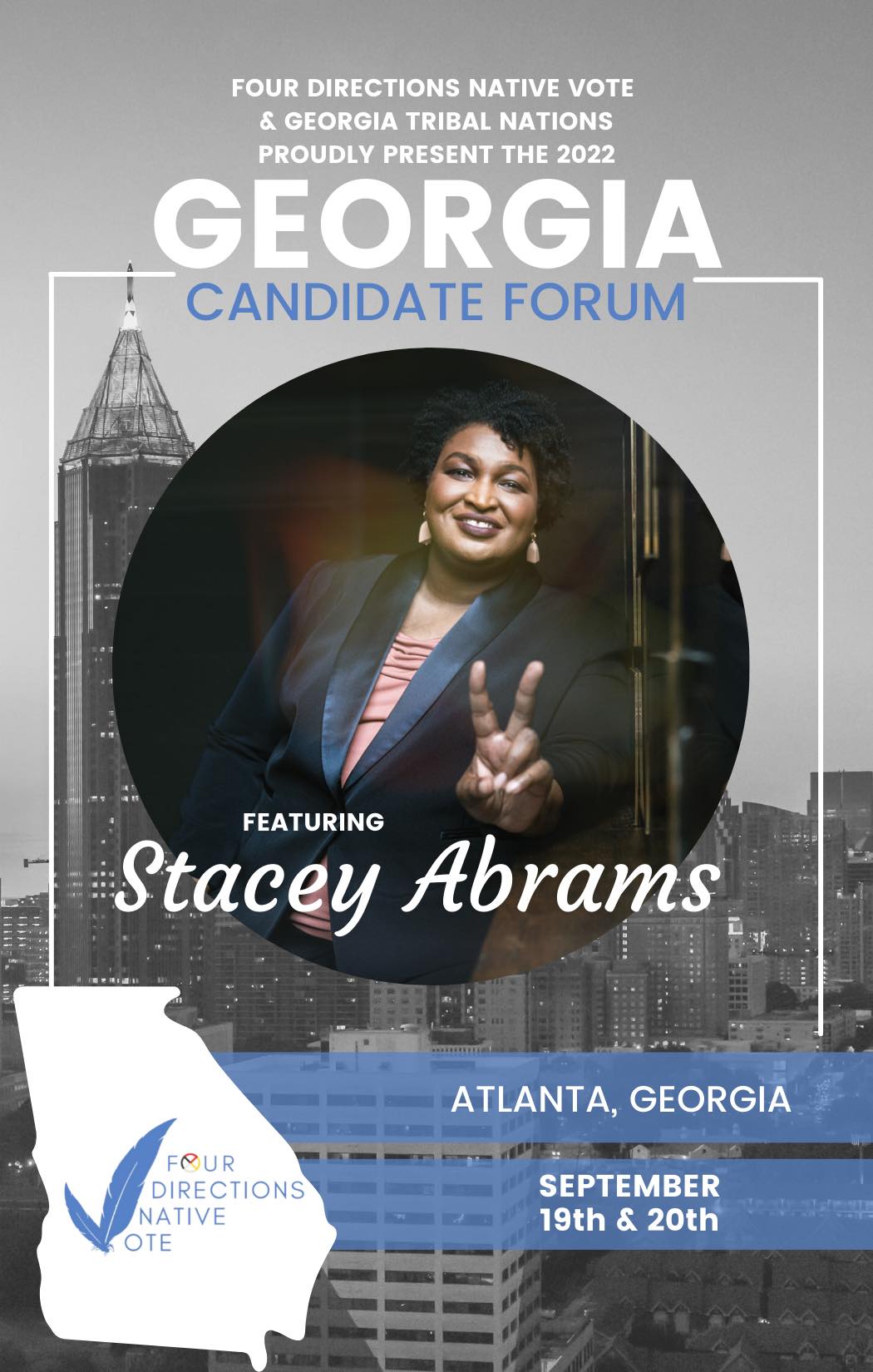
- Details
- By Native News Online Staff
Four Directions Native Vote, a non-partisan Native American voting rights organization, is hosting a Native American election forum in Atlanta, Georgia on Monday and Tuesday. Joining Four Directions will tribal leaders from the state to host candidates running for elective office in the midterm elections this November.
The forum will be held at the ZuCot Gallery in Atlanta—providing an opportunity for candidates to engage with the issues most important to Native communities in Georgia and across Indian Country.
On Monday, gubernatorial candidate Stacey Abrams and incumbent Sen. Raphael Warnock (D-GA) will participate individually in a question and answer session facilitated by Four Directions co-founder and co-executive director O.J. Semans, Sr. (Rosebud Sioux).
“Times have changed since we went to war to fight for our way of life, our treaties, and our Tribal sovereignty. We now must protect our communities and our rights by going to the polls to vote”, said Semans, Sr.. “We believe voting is within our sacred circle when it comes to preserving our way of life. We are committed to full enfranchisement as a crucial way to navigate a stronger future for our Native communities. Native issues and candidate forums catalyzed Native Voter turnout in 2020 and we know they have the power to do so again in 2022.”
Four Directions estimates there are approximately 146,000 Native Americans of voting age living in Georgia. In 2020, the presidential election was decided by a margin of less than 12,000 voters. As Native voter turnout trends upwards across the country, there is no question Indigenous voters have the power to decide the outcome of every statewide election in Georgia.
Immediately preceding each keynote conversation, a panel of tribal leaders from throughout Indian Country will offer insight into the far reaching impact of election results in Georgia. The two panels, "Impact on Indian Country: The Native Vote in Georgia" and “A Friend to Indian Country: Why State Governors Matter", will illuminate the interconnectedness of Indian Country and every congressional and gubernatorial election. Voters will learn about important factors to consider before they cast their ballots.
Former Sen. Heidi Heitkamp (D-ND) is set to open day two with a virtual address speaking to the importance of the vote. Following Heitkamp’s address, audience members and members of the press have the opportunity to engage with congressional candidates from both major parties during a series of question and answer sessions. A key function of this event is to support candidates through education and conversation about landmark Native-specific public policy – an admittedly new area of learning for many.
More Stories Like This
Native News Weekly (August 25, 2024): D.C. BriefsNavajo Nation Mourns the Passing of Former Vice President Rex Lee Jim
Deb Haaland Earns Endorsement From Communications Workers of America Local 7076
University Soccer Standout Leads by Example
Two Native Americans Named to Democratic Congressional Campaign Committee's“Red to Blue” Program
Help us defend tribal sovereignty.
At Native News Online, our mission is rooted in telling the stories that strengthen sovereignty and uplift Indigenous voices — not just at year’s end, but every single day.
Because of your generosity last year, we were able to keep our reporters on the ground in tribal communities, at national gatherings and in the halls of Congress — covering the issues that matter most to Indian Country: sovereignty, culture, education, health and economic opportunity.
That support sustained us through a tough year in 2025. Now, as we look to the year ahead, we need your help right now to ensure warrior journalism remains strong — reporting that defends tribal sovereignty, amplifies Native truth, and holds power accountable.
 The stakes couldn't be higher. Your support keeps Native voices heard, Native stories told and Native sovereignty defended.
The stakes couldn't be higher. Your support keeps Native voices heard, Native stories told and Native sovereignty defended.
Stand with Warrior Journalism today.
Levi Rickert (Potawatomi), Editor & Publisher


